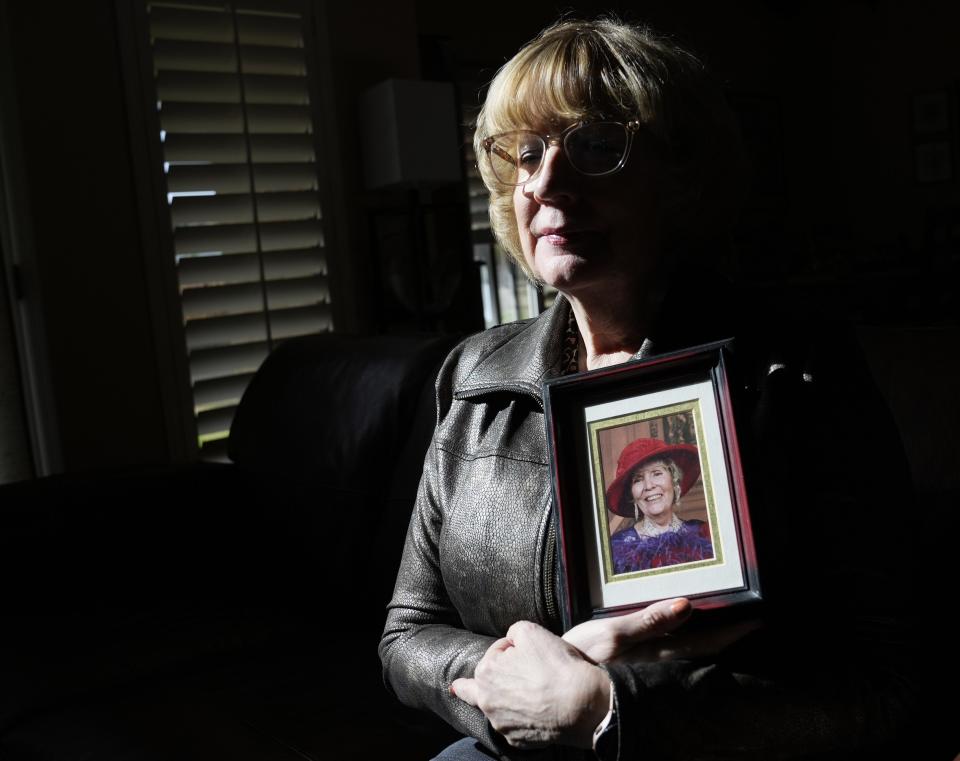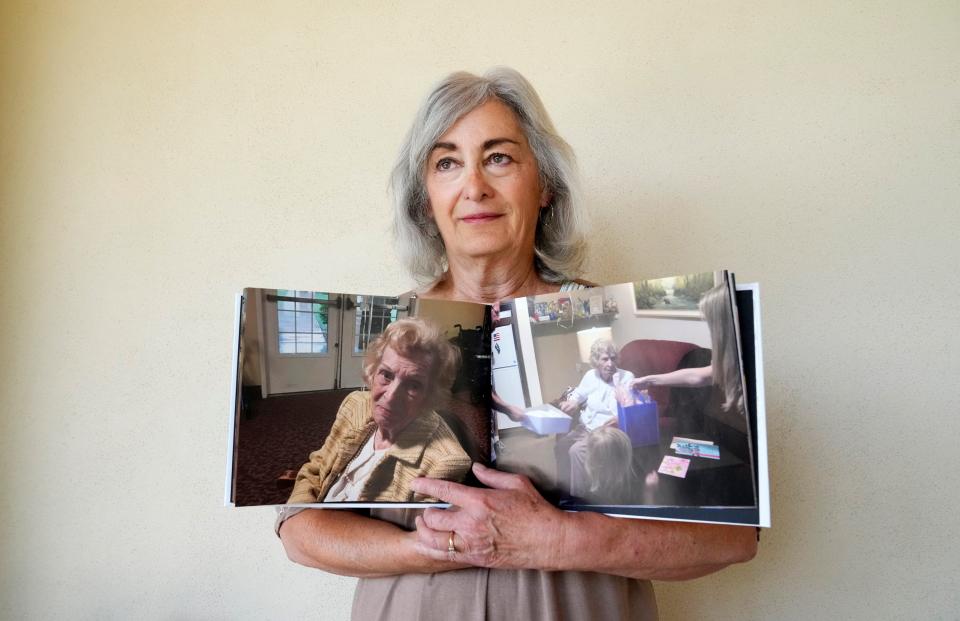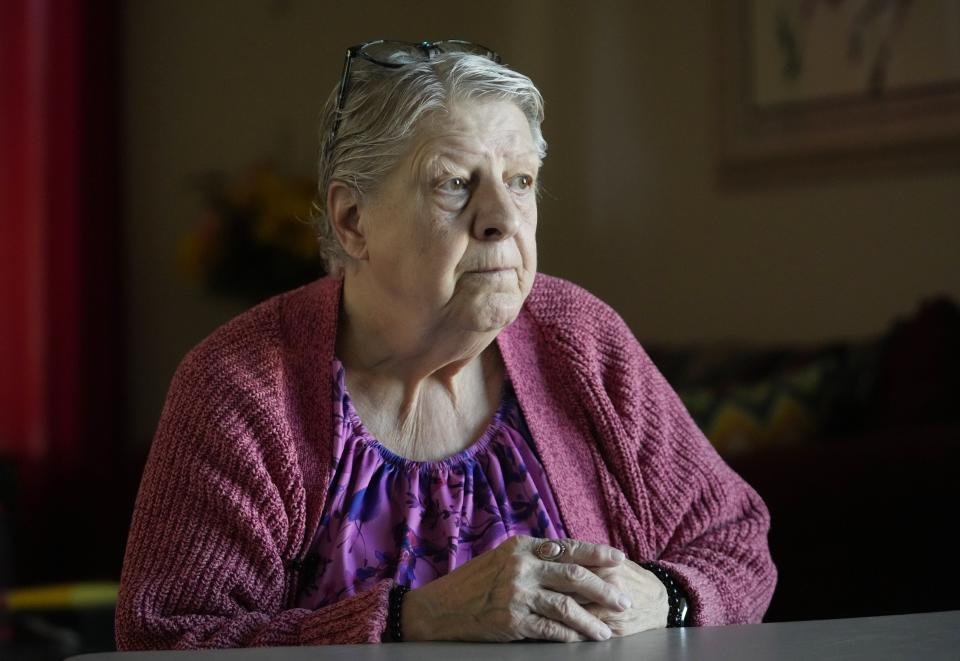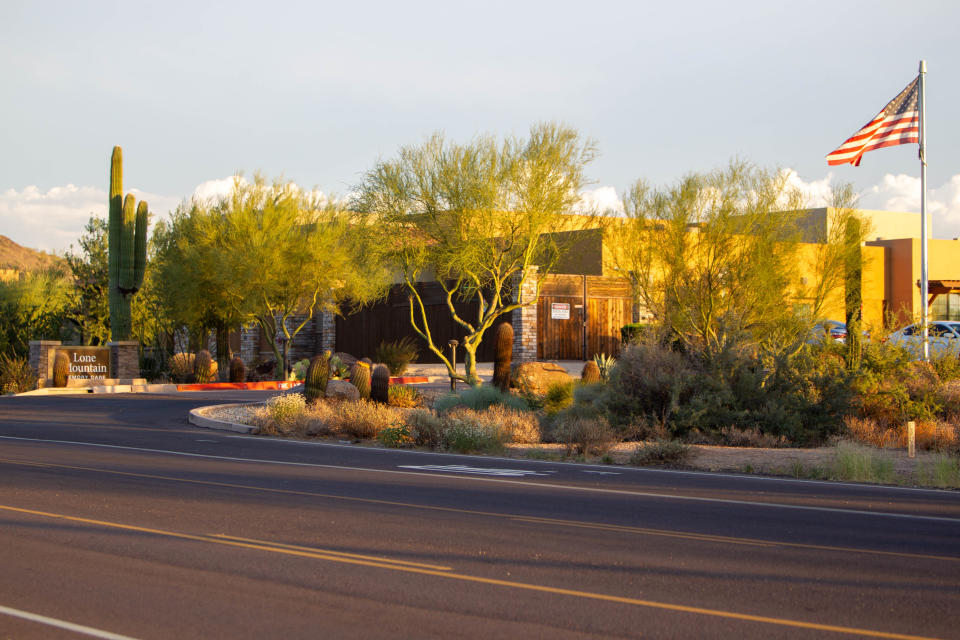Lawmakers, governor seek major changes for assisted living in Ariz. following Republic investigation
Two Republican lawmakers want to prevent Arizona senior living facilities from keeping resident and employee injuries secret.
A bill introduced at the state Capitol is one of several measures expected in the coming weeks that could make facilities safer. Arizona has some of the weakest protections for assisted living residents in the country, but if the proposed changes are enacted the state could emerge as a leader in stringent oversight.
The movement for reform responds to problems exposed by The Arizona Republic's investigative series "The Bitter End," which chronicled residents hurting each other and employees, poor care and sexual assaults in senior living.
Gov. Katie Hobbs also plans to push a package of bills to address the problems and her recent budget proposal includes funding for 15 more inspectors of licensed facilities — like nursing homes and assisted living centers — who can levy fines and citations.

Hobbs' plan also would create three new long-term care ombudsman positions at the Department of Economic Security, "to make sure that families who need a place to report incidents to and have support have a place to go,” the governor told reporters Wednesday.
She said The Republic’s reporting was a “driving factor” for her proposals.
Catch up: Arizona senior living facilities are often understaffed, endangering workers and residents
The legislation introduced this week by Reps. Quang Nguyen and Selina Bliss, both Prescott Republicans, is separate from Hobbs’ proposal.
The Republicans' legislation would:
Require assisted living facilities to report to the Arizona Department of Health Services when residents hurt each other or hurt employees.
Require facilities to report serious injuries to families and notify them of any follow-up action they took to prevent future incidents.
Allow facilities to install cameras in common areas, like hallways.
Require facilities to allow residents and their families to install cameras in their rooms.
Require the director of the Arizona Department of Health Services to create rules around the use of cameras in assisted living facilities and nursing homes
Forbid facilities from keeping or hiring employees found by Adult Protect Services to have abused, neglected or exploited a vulnerable adult.
People harmed by the broken senior living system are hopeful for change.
“By the time I end up in one of those, it’ll be better,” said Susan Severe, a caregiver who had her eye nearly ripped from its socket by a resident at a Cottonwood facility in 2021.
Requirements for reporting let incidents fly under radar
Assisted living facilities do not have to tell the state health department about most nonfatal resident injuries even though the department is charged with licensing and investigating them.
Facilities only have to report to police or Adult Protective Services about resident altercations that end in injury. Law enforcement officers generally do not investigate systemic abuse and neglect, and protective services keeps most of its work secret and rarely substantiates complaints.
When residents hurt each other, facility employees only have to conduct an internal investigation and keep it on file for a year. They don’t have to share it with anyone, unless they’re subpoenaed or the state health department asks for it.
These conditions allowed what happened to Jennie Fischer to fly under the state’s radar and even leave her own family in the dark.

The 101-year-old woman was living in the memory care wing of Brookdale North Mesa in January 2020 when management paired her with a roommate.
Jennie’s family immediately started having problems. The roommate stole Jennie’s wheelchair. She pushed her. She slapped at Jennie’s daughter when she’d try to intervene.
More: Tragedies at 2 Arizona dementia care units leave families shattered, outraged
Sometimes people with dementia lash out thinking they are protecting themselves. Especially when they have the disease for a long time, which her roommate had.
Jennie’s daughters felt their mom was unsafe and asked management to move her roommate. That request was declined and the facility manager said the new roommate was harmless, but soon after Jennie was found on the floor with a broken arm. She said her new roommate had pushed her. She died a month later, with the broken arm listed as a contributing factor.
Unbeknownst to Jennie's family but not the manager, the new roommate had killed her previous roommate at another facility three weeks prior after a medication error.
Still, the health department wasn't informed about Jennie's death and never investigated it.
The Republicans' bill would prevent such secrecy in the future. Joey Wilson, one of Jennie’s daughters, said her mother would be proud to be part of the change.
“If they had to report injuries maybe they would have been more responsible for doing something, listening to the family … something,” Wilson said. “Brookdale just didn’t have any accountability, at all.”
Brookdale has told The Republic that their residents’ “health, safety and well-being is our top priority” but has declined to comment on Jennie's case.
Cameras could provide evidence when residents can't
In addition to reporting requirements, the Republicans' bill would make it easier for families and facilities to monitor residents.
A Republic review of dozens of police reports found that law enforcement seldom substantiates sexual assault claims from seniors living in memory care units. The cases are rarely witnessed and easily dismissed as misunderstandings or hallucinations.
But The Republic found some facilities and state agencies ignored warning signs that could have prevented sexual assaults.

Having cameras in residents’ rooms could help validate residents who are dismissed. Cameras also could prevent employees from taking advantage of them, said Dana Kennedy, AARP Arizona director, who worked with lawmakers on the legislation.
The provision in Nguyen and Bliss’s bill allowing families to install cameras came from Kennedy’s frustration after reading The Republic’s investigation on sexual abuse, she said.
The piece featured a facility that hindered a police investigation after one resident inappropriately touched another; a caregiver who was reported to police three times for sexual and physical abuse before he finally was caught and charged with rape; and a nurse who was groped by a resident convicted of sexually assaulting another caregiver just months before.
“I was so furious after that,” Kennedy said. “It was like well, how do you — how do you stop this?”
Who's to blame?: Arizona senior care centers face little accountability when residents, staff are sexually assaulted
The bill also would require the health department to adopt rules around the use of cameras in senior care facilities, and allow — but not require — those facilities to place cameras in common areas like hallways.
A former police detective whose wife was sexually assaulted by another resident at Scottsdale's Lone Mountain Memory Care in 2022 said he would have liked the option to install a camera in his wife's room and watch over her even when he wasn't at the facility for one of his daily visits.

The Republic does not generally share the names of sexual assault victims, and is not sharing the man's name to protect the identity of his wife.
The bill doesn't go far enough, he said.
He’d like to see requirements for senior care centers to have surveillance in common areas — and consequences for facilities that fail to comply.
Without those requirements, "They won't do it. I guarantee you they will not do it," he said. "They need to put more teeth in it."
Responding to that critique, Bliss said the legislation was a start.
"It gets our foot in the door and then if we want to strengthen this, we have something to build on it for next session," she said. "If we go for too much, we could risk losing the bill altogether. So, in our book, a little is better than nothing."
Legislation would bar abusive employees from facilities
Another key piece of the proposal would prevent facilities from hiring or keeping abusive employees.
Adult Protective Services’ website states that its registry — a list of people the program found to have abused, neglected or exploited a vulnerable adult — exists to protect vulnerable adults from being hurt by someone who has done it before.
But senior care centers are currently free to hire people on that list. And Adult Protective Services rarely adds people to it.
The Republic found that over the course of two years, protective services opened investigations into more than 1,600 allegations of sexual abuse and assault. During the same time period, the program substantiated less than 1% of that number.
Those low substantiation rates are part of what allowed Manuel Corral, formerly a caregiver at Heritage Village assisted living center in Mesa, to work at facility after facility over several years even as he was repeatedly accused of abusing residents. He was finally arrested for rape after he attacked a resident in 2020.
While Corral was arrested on rape charges, he ultimately pled guilty to three counts of attempted sexual assault. His name was added to the Adult Protective Services registry nearly a year after his arrest, and he was sentenced to seven years in prison.
But Corral was reported to police three times for physically or sexually abusing residents at facilities where he worked before Heritage Village.
History: Arizona senior living center where resident killed roommate has had nearly 150 citations since
He was fired from at least one and suspended from another. He was reported to Adult Protective Services at least twice, but his name never showed up on the registry — and even if it had, senior care centers could have hired him.
While the proposed change in law would prevent people like Corral from working at facilities, it does not address ways to expedite getting people's names on the list.
Advocates hopeful for significant year of reform
AARP Arizona has pushed to improve the senior living system for years with little traction. But this year is different — Kennedy said she's never experienced more momentum. Everyone wants to improve the system, she said.
How the system enables violence: At an Arizona senior living center, a resident killed another
Even without a legislative mandate, the state health department is investigating and citing facilities more often in light of "media oversight," the director of the board that licenses facility managers said during a recent legislative committee hearing. He said his team has, as a result, investigated more managers.
The Republic's investigative reporting in 2021 also influenced changes on that board, including a law that forbids the board from licensing people to run nursing homes if they have felonies for fraud.
Confer also told the committee that news articles pointed out in 2021 that the board wasn't opening all of the cases @AZDHS referred to them.
"That policy changed. We open every single case that hits the front door. It's investigated. And it gets to the board for review."— Caitlin McGlade (@CaitMcGlade) January 12, 2024
"We knew that there was abuse and neglect in these facilities for a long time and I always said after Hacienda, the evidence was a baby," Kennedy said, referencing a 2018 case when an employee raped and impregnated a patient who was quadriplegic and couldn't communicate. "The evidence here is the reporting."
Arizona Republic reporter Stacey Barchenger contributed to this report.
Reach Caitlin McGlade at caitlin.mcglade@arizonarepublic.com. Follow her on X, formerly Twitter, @caitmcglade. Reach Sahana Jayaraman at Sahana.Jayaraman@gannett.com. Follow her on X, formerly Twitter, @SahanaJayaraman.
This article originally appeared on Arizona Republic: Bill would require Arizona assisted living centers to report injuries

